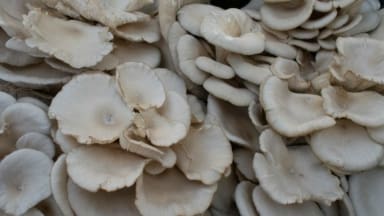
The new mushroom farm will grow Oyster, Lion’s Mane and other varieties of mushrooms on spawn-inoculated substrate (the growing surface) created from Blenheim Palace waste, such as recycled coffee grounds, compostable packaging and sawdust. The project is part of Blenheim Palace and Estate’s 10-year plan is to become carbon neutral on scopes 1-3 of the Greenhouse Gas (GHG) protocol across all operations by 2027.
The harvested mushrooms will not only be used in the kitchens at Blenheim Palace, but dried and sold in the Palace shop, as well as being sold fresh to local pubs and restaurants. Reportedly, several Oxfordshire venues, including Michelin-starred restaurants local to the Palace, have expressed interest to source Blenheim’s mushrooms. The first harvest is expected in September.
The mushroom farm, based in Combe, Oxfordshire, will consist of three units – one for preparation of the substrate and inoculation with mushroom spawn; one for incubation; and a fruiting room.
The preparation of the substrate will be carried out using Tumblebug’s Ecobot. After the harvest from each substrate block is complete, the used substrate will be converted to biochar pellets, energy, and carbon credits. Energy from the new [patent pending] pyrolysis unit will be used to heat the farm and its barns. It is the latest stage in the Country Estate Carbon Demonstrator Project, Blenheim Estate’s collaboration with environmental consultants Tumblebug, and the first of its kind in the UK.
The Country Estate Carbon Demonstrator Project will unlock the value of Blenheim’s organic waste (food, coffee, compostable packaging, card, manure, green horticultural waste, forestry waste and sheep wool) using Tumblebug’s Ecobot machines and pyrolysis technology.
Roy Cox, Managing Director Estates at Blenheim Palace, said: “This project is a major step towards us becoming a net zero business by 2027 and it’s exciting to be part of such a pioneering initiative. Using mushrooms in our restaurant kitchens which have been grown using our own organic waste is the perfect example of a self-sustaining circular ecosystem in action.”
Tumblebug has partnered with fungi partner Urban Farm-It to develop the circular mushroom farm concept. Urban Farm-It will supply the mushroom spawn which will be used in conjunction with the substrate produced by Tumblebug’s own Ecobot machines. The long-term aim for the two partners is to design and sell mushroom farms as ‘cookie cutter’ models and use the engaging story of mushrooms as an education tool to engage people with regenerative solutions.
Tumblebug Founder and CTO, Sylvie Verinder remarked: “Recovering organic waste to grow mushrooms, with the added benefit of producing green energy and biochar for our growing medium and fertiliser products, not only accelerates the route to Net Zero but has economic and social benefits.”

